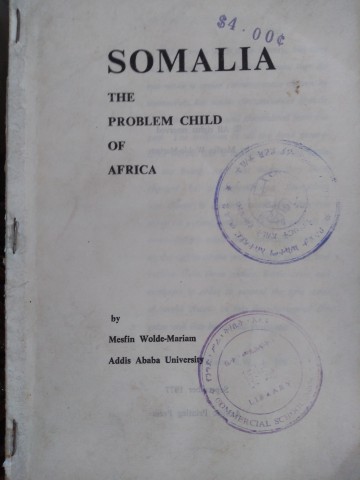One of the Horn of Africa's long-time scholars, Christopher Clapham, wrote "The Horn of Africa: State Formation and Decay" (2017), with Oxford University Press. A lot of the book, expectedly, focuses on Ethiopia. And, unfortunately for Clapham, the world of Ethiopia and the Horn has changed dramatically since. The book is accessible, which is often a nicer way to say this is not a detailed academic book for experts of the area but for students and/or generalists who might be interested to learn about the region. I am sure experts will read this book / have read this book, but may take away comparatively less (that said, a number of leading academics of the region have cited this book). I collected a few notes on ethnicity and on the Somali state, which are below:
"All ethnicities, nonetheless, are to some extent fluid, and this fluidity is encouraged in the societies of the northern highlands by the principle of bilateral descent. Whereas in most African cultures, to which lineage is characteristically extremely important, descent is traced primarily either through the male (patrilineal) or female (matrilineal) line, in this region each enjoyed a broadly equal status, and hereditary rights in land in particular could be claimed either through one's father or one's mother. This made it relatively easy to blur one's identity, by selectively emphasising the most advantageous line." (p. 13)
"The genie of ethnicity, however, once unleashed, could not be put back in its bottle. The assumption, derived from the TPLF's (and especially Meles Zenawi's) ideological commitment to Marxism, that ethnicity was no more than a superstructural phenomenon derived from economic exploitation, which could in turn be neutralised by representation and development, proved utterly inadequate. Instead, predictably enough, ethnic identities have become increasingly entrenched within a system that had been intended to nullify them. A new politics of identity has emerged, despite (and not least within) a hegemonic party that has become decreasingly able to control the forces of proliferation that it did not create (since these were already implicit in the mismatch between the state and its population), but which it had at least sought to manage." (p. 107)
"Somali societies have operated in the absence of formal government institutions in a way that could scarcely be conceived in the agricultural highlands of the Horn, where the breakdown of hierarchical control has been coterminous with violence. Nowhere is this clearer than in the operation of an economy that has functioned with remarkable efficiency despite the lack of overall political control, and has in the process spared many Somalis the levels of destitution that statelessness might have been expected to bring with it." (p. 149)


